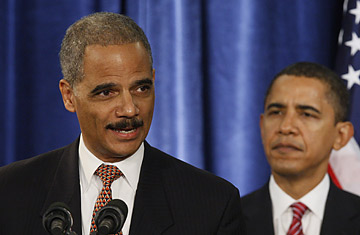
Eric Holder
From political litmus tests in its hiring process to its justifications for wiretapping and torture, the Justice Department was the epicenter of George W. Bush's most controversial policies. So more than any other nominee to Barack Obama's Cabinet, would-be Attorney General Eric Holder — a former District of Columbia Superior Court judge and Deputy Attorney General during Bill Clinton's presidency — should expect his time before the Senate to be a referendum on the departing President. (See who's who in Obama's White House.)
Democrats will want to know: Would Holder press for the "reckoning" demanded by liberal advocacy groups, even if criminal investigations get in the way of Obama's hope for bipartisan comity? Or, as Republicans prefer, would he leave the past behind? And what about his willingness to stand up to his boss and friend? As the Judiciary Committee's ranking Republican, Arlen Specter, put it, "[Holder] has an outstanding academic and professional record ... But sometimes it is more important for the Attorney General to have the stature and the courage to say no instead of to say yes." (See the top 10 contested officeholders.)
Holder, currently a partner in the prestigious Washington law firm Covington & Burling, has kept with tradition and stayed mum in advance of the hearing. But an Obama transition official says that Holder believes the Attorney General should "serve the American people, not the President, not any one political party," and base decisions solely on law and fact. He added that apart from strengthening DOJ's role in counterterrorism, Holder's principle objective would be to "restore credibility" to the department.
If Holder sticks to those lines, he should be able to walk nimbly between his inquisitors when it comes to the handling of DOJ's recent past and immediate future. But inevitably, once politics are out of the way, the Senate will turn to Holder's record, which is a good deal more complicated than his rhetoric.
There is plenty of evidence that Holder can turn a blind eye to politics. As U.S. Attorney in 1996, Holder prosecuted and sent to prison Representative Dan Rostenkowski, one of the most powerful Democrats in Congress. Two years later, as Deputy Attorney General, he gave independent counsel Kenneth Starr the legal authority to probe into Monica Lewinsky's relationship with President Clinton.
But in other politically loaded cases, Holder seemed all too accommodating to political benefactors. The most notable of these is Bill Clinton's 2000 pardon of fugitive Marc Rich — which Holder facilitated — and the 1999 clemency Clinton granted to imprisoned members of FALN, a Puerto Rican nationalist group linked by the FBI to bombings, armed robberies and murders. Republicans accused the President at the time of using the commutations to draw Puerto Rican support in New York for the budding senatorial campaign of his wife. In the conservative National Review, Andrew C. McCarthy opines, "With the FALN pardons, [Holder] helped foster an atmosphere where terrorist clemency was not out of the question — even though the United States was then being targeted for terrorist attacks."
Even in the Lewinsky case, Holder appeared to reverse course and seemed determined to blunt the investigation he had unleashed, lending DOJ's legal support to a dubious privilege claimed by the Secret Service to keep its agents from testifying.
The nominee's closest friends and defenders acknowledge that Holder made mistakes in the Rich case. But they explain his support for the FALN clemency as simply executing the President's constitutional right to commute prison sentences. And they say his views of the Starr investigation evolved because of questionable actions by Starr, not White House pressure. Holder will have a chance to answer every challenge to his integrity. The Judiciary Committee will test how well those explanations hold up.
